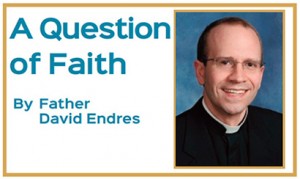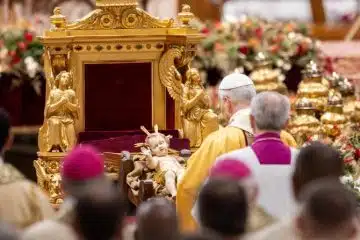Fr. Endres A Question of Faith: Asking for mercy at Mass
 Q: At the beginning of Mass during the penitential act, the priest/deacon asks for God’s mercy on behalf of the people, but in doing so he never mentions the sins for which we need mercy. Is it allowable to mention specific sins at this time?
Q: At the beginning of Mass during the penitential act, the priest/deacon asks for God’s mercy on behalf of the people, but in doing so he never mentions the sins for which we need mercy. Is it allowable to mention specific sins at this time?
The penitential act at the beginning of Mass provides an opportunity to call to mind our sinfulness, yet the prayer, as you note, does not give voice to any particular sins. Instead, the act invites interior reflection on the individual’s need for forgiveness and provides a reminder that Christ conquered sin and death. It allows for a humble preparation of the mind and heart to actively participate in the Mass.
To this end, the penitential act takes a variety of forms with differing emphases. The forms of the act include: 1) the Confiteor (“I confess to almighty God …”); 2) a dialogue between priest and people that ends, “Lord, show us your mercy and love/ And grant us your salvation”; and 3) the most familiar form: three mercy invocations followed by “Lord, have mercy / Christ, have mercy / Lord, have mercy.”
In the Confiteor, one’s personal responsibility for sin is emphasized. In the second form, we ask succinctly for God’s mercy. In the last form, which can be quite varied (for example, “You were sent to heal the contrite, Lord have mercy; You came to call sinners, Christ have mercy; You plead for us at the right hand of the Father, Lord have mercy, etc.), we acknowledge God’s saving power through Jesus. In each case, a prayer of absolution concludes the penitential act.
The prayer of absolution, “May almighty God have mercy on us, forgive us our sins, and bring us to everlasting life,” differs from the prayer that concludes the sacrament of confession and does not have the same effect. Though the prayers of the Mass do remove lesser, venial sins, more serious sin should be taken to confession.
The penitential act has developed over time. In the early church, specific sins could be named. The Confiteor – the only form of the penitential act previous to the liturgical reforms of the Second Vatican Council – grew out of the penitential practices of monks that had included an acknowledgement of particular sins. By the twelfth century, the naming of specific sins was replaced by a more general reminder of man’s sinfulness.
In the current practice, the penitential act is meant to be a general confession of sins. During this part of the Mass, however, the desire to make a quick examination of conscience is nevertheless a good thing. When entering into the Mass, it is appropriate to call to mind those thoughts, words, and actions that weaken our relationship with God and with one another. Mindfulness of certain personal sins could be done privately at the “brief pause” after the introduction of the penitential act. However, for the priest to name common sins out loud would be contrary to the purpose of this brief section of the Mass.
At the beginning of Mass, this general acknowledgement of sins is important for us, for as John says, “If we acknowledge our sins [to the Lord], he is faithful and just, and will forgive our sins and cleanse us from every wrongdoing” (1 John 1:9).













